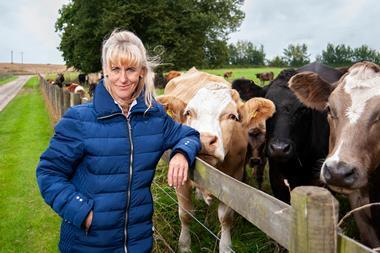Eight years on from the referendum, the ‘bonfire’ of EU red tape has yet to really get going. So what are the potential benefits, and what are the pitfalls as civil servants struggle under the regulatory strain?
When Jacob Rees-Mogg promised a “bonfire” of EU laws in the post-Brexit haze, it conjured up images of a momentous, relationship-ending event. Ministers gleefully burning European Union statute books outside parliament on New Year’s Eve, perhaps, after which London and Brussels would go their separate ways, never to be reunited.
It hasn’t quite worked out that way. Brexit certainly offered ministers and regulators the chance to untangle the UK from Brussels’ infamous red tape. But the so-called bonfire – one of the supposed positives of Brexit, with more freedom for food and drink – turned out to be more of a slow burn. Facing over 6,000 EU laws, the civil service has struggled with the workload.
So, eight years on from the historic referendum, how has our food regulatory landscape changed? What opportunities has Brexit delivered for the sector? And have the changes worked out?
To help decide which EU laws to keep and which ones to ditch, the government put forward the Retained EU Law (REUL) Bill, giving parliament the power to revoke, amend or keep legislation carried over from our time in the bloc more easily. The act would “speed up the process of removing years of burdensome EU regulation in favour of a more agile regulatory approach”, the government claimed.
When it was initially passed, the REUL Bill came with a controversial “sunset clause”, meaning all laws brought over from the EU would expire automatically after December 2023, unless actively retained.
But by the time the civil service had identified over 6,000 EU laws in UK statute books that had to be reviewed and potentially amended or replaced, the magnitude of the task had become clear.
Government progress on EU laws
- 6,757 total REUL
- 4,524 unchanged
- 759 amended
- 1,369 repealed
- 39 replaced
- 62 expired
- 4 TBC
The task was particularly onerous for certain departments. Defra alone was responsible for reviewing 1,930 pieces of legislation, while the Department for Business & Trade and the FSA oversaw 386 and 114 laws respectively.
At a Westminster food & nutrition forum last year, FSA chair Susan Jebb warned the chance to change EU rules was “coming down the tracks really rather fast” and that regulators faced “real challenges over resources”.
Business and trade secretary Kemi Badenoch was then forced in May 2023 to admit the cut-off date posed “legal uncertainty”. The deadline was ditched and replaced with a list of about 600 laws that had to be axed by the end of the year – far lower than the initial pledge to revoke thousands of EU laws.
The changes brought a collective sigh of relief from an overstretched civil service. “When REUL first came out, and it had that end-of-year guillotine that anything not retained was going to fall away automatically, the civil servants were all working like crazy,” a senior farming lobbying figure tells The Grocer. “When that got moved, the time criticalness of it all went away.”
Progress has certainly slowed. So far, only about a third (32.9%) of EU laws have either been amended, repealed or replaced (see box, overleaf). There are 4,524 still waiting to be reviewed, compared with 6,757 in 2017. The government has now given the civil service until June 2026 to revoke or reform over half of all REUL.

Softened standards?
In addition to identifying and reviewing EU-inherited laws, Badenoch also introduced the Smarter Regulation Programme. This applies the “same scrupulous lens [as REUL] to wider domestic regulation” to ensure the UK’s whole regulatory landscape is “effective and fit for purpose” and that regulation is “a last resort, not a first choice”.
Some major REUL reforms have been, or are set to be, delivered through the Smarter Regulation Programme, including reformed regulations on the production and marketing of wine, introduced in January this year.
The moves would save the wine industry administrative and financial burden, said Defra secretary Steve Barclay at the time. He pointed to changes to importer labelling, restrictions on the making and selling of piquette, plus allowing English sparkling wine makers to ditch mushroom-shaped stoppers and foil covers on bottlenecks. He also famously announced pubs would be able to sell pints of pre-packed wine.
The government has also relaxed EU regulations around packaging and labelling of fmcg goods. That allows brands to “benefit from lower manufacturing costs and more effective global supply chains” and will create “conditions for innovation and competitiveness”, says Phil Peters, head of supply chain for consultancy group YF.
Peters points out the effect on areas such as health claims and organic certifications, where the EU is notoriously strict. Tiptree jams, for example, used to follow strict EU guidelines for their ingredient listings and nutritional information. Post-Brexit, however, they’ve had “more flexibility in their labelling, which means they could explore more creative redesigns without the need for constant adjustments”, according to Peters. “This reduced their packaging costs and sped up their turnaround time from production to market.”
Camden Town Brewery similarly took advantage of the relaxation of EU health claims regulations. The brand was able to market its beers with claims about natural ingredients and traditional brewing methods. The activity resulted in an uptick in sales “because it resonated better with consumers’ ‘better for you’ buying trends”, Peters says.
“This has resulted in a slew of new food products and new packaging innovations that are better aligned with local consumer demand and sustainability priorities” and “made it easier for smaller challenger brands to bring products to market at a faster rate”, he adds.
Innovation nation?
The biggest opportunities, though, are “likely to be found” in “developing new products and ways of serving consumers”, Peters believes.
Jessica Burt, regulatory lawyer at Mills & Reeve, says the UK can “take advantage of potentially being more ‘fleet of foot’ than [when subject to] the extended decision-making of the EU”.
The government appears to see the potential, too, given there’s been a “political push to prioritise innovation and R&D in the food sector”, she says.
Take gene editing – an area the government claimed was stalled due to EU bureaucracy and the bloc’s strict stance. In March last year, ministers passed the Precision Breeding Act, which allows farmers to use technologies to, for instance, grow gene-edited crops that are drought and disease-resistant and reduce use of fertilisers and pesticides.
Under the act, a new regulatory system was introduced to encourage innovation in food science. The law was hailed as a post-Brexit conquest, the future of food Technology and a great advancement in food security. It put Britain “at the forefront of this revolution”, food minister Mark Spencer said at the time.
The farming source points to the potential here. “This is one area where the UK has chosen a different regulatory route that could have some important implications,” they say.

Another opportunity lies in novel foods. The potential for CBD products, insect proteins and lab-grown meat to become staples in Brits’ shopping baskets wasn’t exactly a key selling point of the Vote Leave campaign. But it could be an area where the UK could “capitalise on our newfound regulatory freedoms”, argues Richard Dillon, CEO of cultivated meat company Ivy Farm Technologies.
Currently, novel food companies face an average wait of two-and-a-half years for approval. Hundreds of products in this potentially multibillion-pound industry are stuck in the queue.
But in April, the FSA put forward plans to fast-track novel foods – including GM foods, smoke flavourings and cultivated meat – to make the regulatory processes simpler and quicker.
The new, more efficient regime would escape EU “bureaucracy”, it claimed. But those proposals, along with gene editing plans, were all put on pause when the July election was announced.
The FSA’s new approach to authorisation of regulated products is “good news and long overdue”, Burt says. “But it may well be too late for a lot of the innovators in those industries.”
And while those in food tech may be looking forward to the regulatory shake-up, not all change is good. Many businesses found the post-Brexit scenario came with added complexity and cost, Burt notes. “They count Europe as their main trading partner, and therefore it’s most economical to continue to abide by EU requirements where there is a divergence.”
She points out to government proposals to roll out ‘Not for EU’ labelling across the whole of the UK as part of the new Northern Ireland trade deal, the Windsor Framework, as an example of added complexity. The requirement “caused such a headache for food businesses”, she adds, as those exporting to the continent or the Republic of Ireland now need to invest in two separate labelling production lines.
There’s also the financial impact of post-Brexit border controls on goods flowing between the UK and the EU. Those include costly vet checks and increased customs fees. “I don’t think you’ll find many businesses that’ll tell you paperwork’s reduced as a result of Brexit,” the farming source says.
Another less-discussed downside of straying away from Europe’s stringent regulations is that the UK actually lost some much-needed protection. This was the case with cheese producers exporting to Canada, who benefited from much higher quotas as a member of the EU than they do under current UK-Canada trade terms.
“There was a sense politically in the wake of Brexit that regulation was a bad thing that gets in the way of business,” the farming expert says. “But when you start looking into things, you realise regulation is there for a good reason.”
Chris Elliott, a food Crime expert who led the horsemeat investigation, points out that “what’s often forgotten is that the UK played a major role in guiding EU legislation. Eight years on, Brexit has achieved nothing positive in terms of protecting UK consumers from consuming unsafe food.”
“The UK has chosen a different regulatory route that could have some important implications”
Plus, getting rid of EU laws to replace them with UK ones doesn’t necessarily make things easier, as food is a devolved power. That affects the dynamics of the four domestic markets, which can lead to “tensions with the Internal Markets Act”, Burt points out. Those tensions have come to the fore with deposit return schemes, single-use plastics, and precision breeding (the latter being approved in England only). All these differences can “cause division within the union, which is an added complication over and above Europe”, she says.
Ultimately, reforming legislation that often took years to be weaved together takes a vast amount of time and effort. As does coming up with totally new regulatory frameworks in areas where policy is struggling to keep up with innovation, as with novel foods.
“The whole baited argument about the bonfire of red tape and Brexit freedoms is ridiculous Politics. They can have all this narrative about getting rid of regulations… but the reality is quite different,” the farming source says. The source believes the government should “much more calmly look at those regulations, the potential downsides particularly in regard to trade with the EU, consult industry, and only then decide whether the payoff is worth it”.
“I wouldn’t subscribe to saying it’s a myth that there’s going to be some regulatory benefits to Brexit – there clearly could be, because we do have the ability to diverge,” they conclude. “But I think they’re going to be sporadic, occasional, and hopefully only in important areas where there’s a real benefit.”

























1 Readers' comment